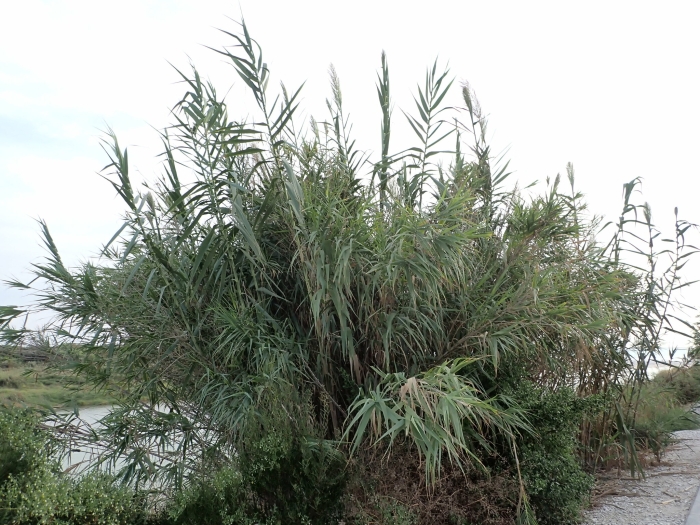Giant Reed
(Arundo donax)
Giant Reed (Arundo donax)
/
/

Lisa Bennett
CC BY 4.0
Image By:
Lisa Bennett
Recorded By:
Copyright:
CC BY 4.0
Copyright Notice:
Photo by: Lisa Bennett | License Type: CC BY 4.0 | License URL: http://creativecommons.org/licenses/by/4.0/ | Rights Holder: Lisa Bennett | Publisher: iNaturalist | Date Created: 2023-09-19T16:32:43-07:00 |







































































Estimated Native Range
Summary
Arundo donax, commonly known as Giant Reed, Giant Cane, or Elephant Grass, is a perennial grass native to riparian areas and wetlands in the Eastern Mediterranean Basin and parts of Asia. It is a robust plant that can reach heights of 20 feet (6 meters) and, under ideal conditions, may exceed 33 feet (10 meters). This species typically forms dense stands with thick, bamboo-like stems and long, sword-like leaves that can be up to 2 inches (5 cm) wide and 24 inches (60 cm) long. The inflorescences are plume-like and can be quite showy, appearing in late summer to early fall.
Giant Reed is valued for its rapid growth and ability to stabilize soil, making it useful for erosion control in appropriate areas. However, its invasive nature and high water use make it unsuitable for many regions. It thrives in full sun and requires ample water, preferring moist, fertile soils. While it can tolerate a range of soil types, it does best in those that are well-drained. In cultivation, it is often used for biomass production, ornamental screens, or windbreaks. Due to its invasive potential, it is not recommended for general garden use and is banned in some areas. It can displace native vegetation and alter habitats, and its dry biomass is highly flammable, posing a fire risk.CC BY-SA 4.0
Giant Reed is valued for its rapid growth and ability to stabilize soil, making it useful for erosion control in appropriate areas. However, its invasive nature and high water use make it unsuitable for many regions. It thrives in full sun and requires ample water, preferring moist, fertile soils. While it can tolerate a range of soil types, it does best in those that are well-drained. In cultivation, it is often used for biomass production, ornamental screens, or windbreaks. Due to its invasive potential, it is not recommended for general garden use and is banned in some areas. It can displace native vegetation and alter habitats, and its dry biomass is highly flammable, posing a fire risk.CC BY-SA 4.0
Plant Description
- Plant Type: Grass
- Height: 14-30 feet
- Width: 5-9 feet
- Growth Rate: Rapid
- Flower Color: N/A
- Flowering Season: Summer, Fall
- Leaf Retention: Deciduous
Growth Requirements
- Sun: Full Sun, Part Shade
- Water: Medium, High
- Drainage: Medium, Slow
Common Uses
Erosion Control
Natural Habitat
native to riparian areas and wetlands in the Eastern Mediterranean Basin and parts of Asia
Other Names
Common Names: Giant Cane , Elephant Grass , Spanish Reed , Caña Brava , Wild Cane , Caña De Castilla , E-Grass , Pfahlrohr , Spanish Cane , Cana Brava
Scientific Names: Arundo donax , Aira bengalensis , Amphidonax bengalensis , Amphidonax bengalensis , Amphidonax bengalensis , Amphidonax bifaria , Amphidonax bifaria , Arundo aegyptia , Arundo aegyptiaca , Arundo aegyptiaca
GBIF Accepted Name: